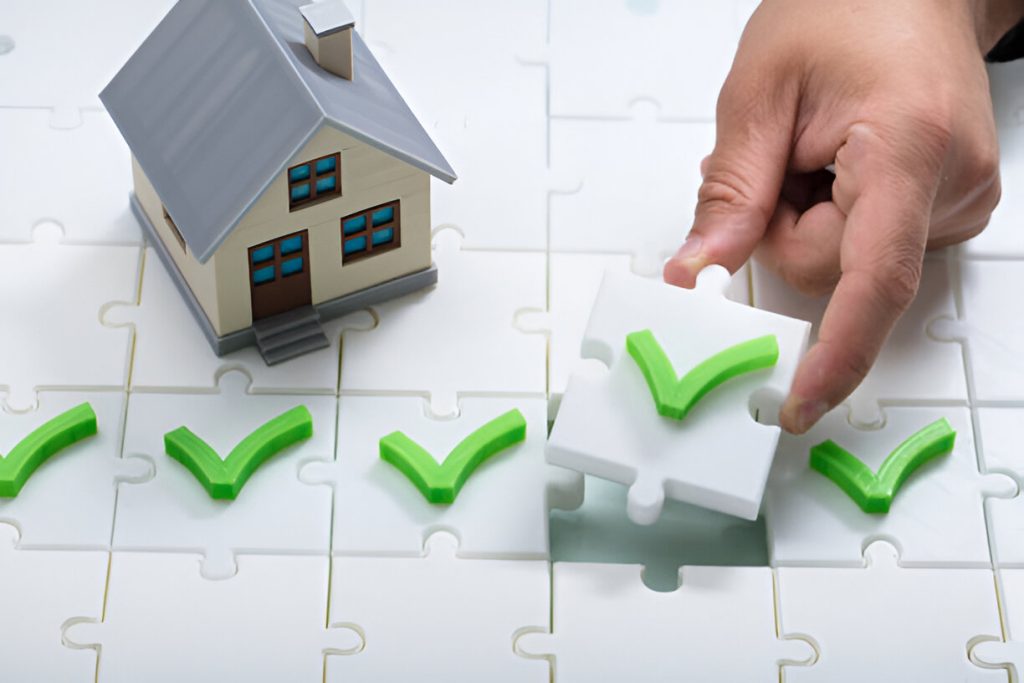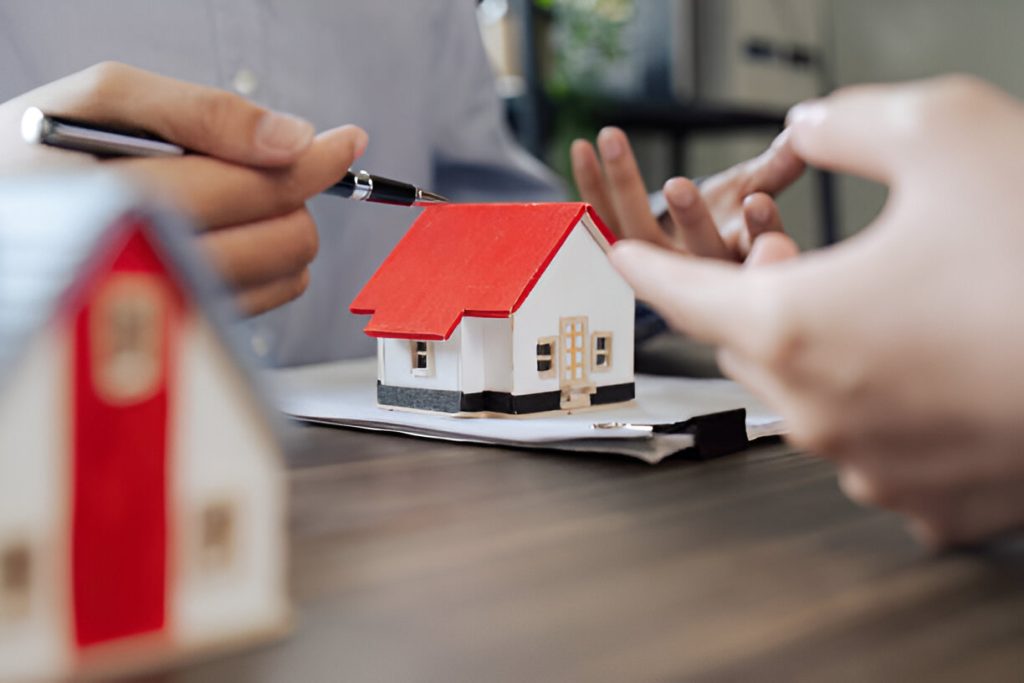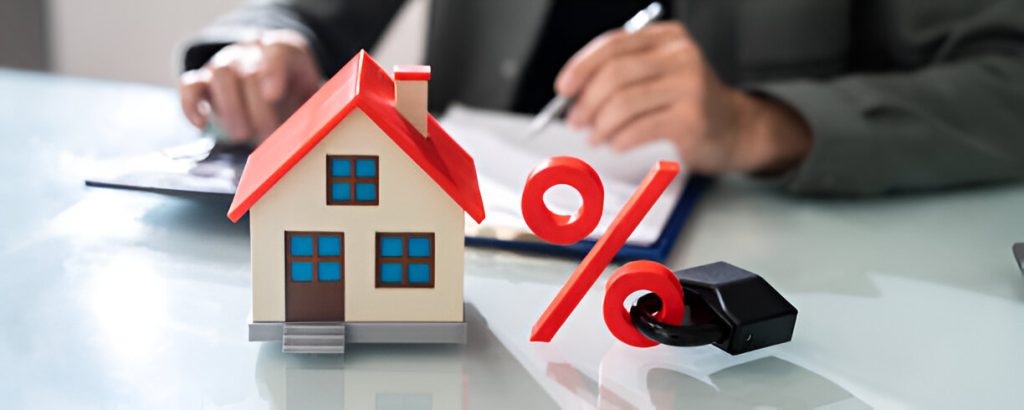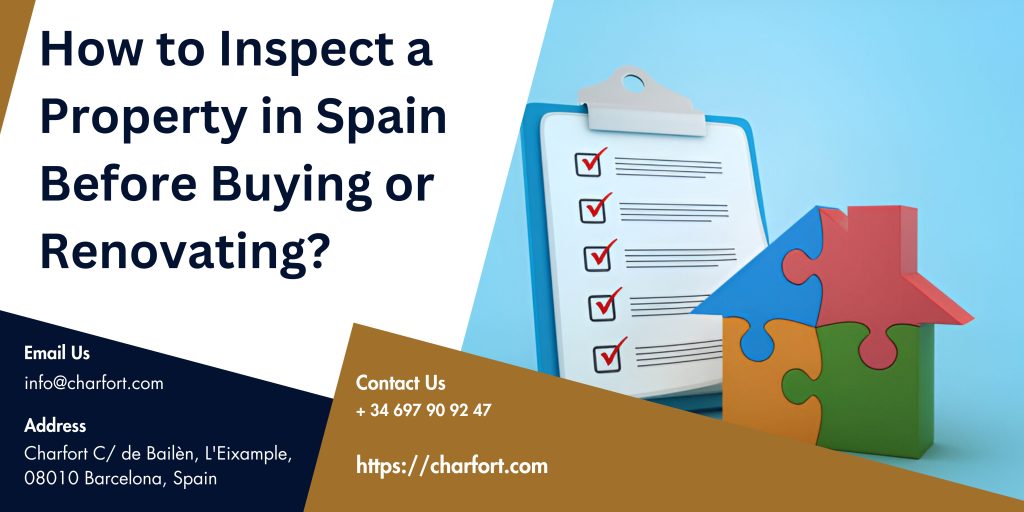
When considering a property investment in Spain, one of the crucial steps is to inspect the property thoroughly. Inspect a Property in Spain? It’s not just about checking the basics but understanding the finer details that can impact your investment significantly. For a reliable and professional approach, our property inspection services at Charfort ensure that every aspect of the property is scrutinized to meet your expectations.
Why Should You Inspect a Property in Spain Before Buying?
If you’re considering buying property in Spain, taking the time to inspect the place in person is essential. Here’s why a thorough inspection is a smart move before making a purchase.
Get a Feel for the Property
When you visit a property in Spain, you can get a genuine sense of what it’s really like. Photos and descriptions online can be deceiving. By walking through the space, you’ll experience the layout, the quality of finishes, and the overall feel. Is the property as charming as it looked in pictures? Does the layout suit your needs? Being there in person helps you answer these questions firsthand.
Check for Hidden Issues
Even if a property looks great in pictures, it might have underlying issues that aren’t immediately obvious. For instance, you might find problems with plumbing, electrical systems, or even the structural integrity of the building. During your visit, you can check for signs of wear and tear, damp spots, or any repairs that might be needed. A thorough inspection can help you avoid unexpected expenses after the purchase.
Assess the Surroundings
Visiting the property also lets you assess the neighborhood and surroundings. You’ll want to check out the local amenities, public transport, and the overall vibe of the area. Is it as convenient and pleasant as you hoped? Are there any noise issues or construction projects nearby that might affect your living experience? Seeing the neighborhood in person gives you a better idea of what to expect.
Verify Legal and Building Compliance
When buying property in Spain, it’s crucial to ensure that everything is in order from a legal standpoint. While you’re inspecting the property, you can also verify that the building complies with local regulations and codes. This includes checking if all necessary permits are in place and if the property is free from legal disputes or encumbrances.
Avoid Buyer’s Remorse
Imagine investing in a property only to find out later that it doesn’t meet your expectations or has hidden issues. By inspecting the property before you commit, you reduce the risk of buyer’s remorse. You’ll have a clearer understanding of what you’re buying and can make an informed decision, avoiding potential regrets and ensuring that your investment is sound.
Taking the time to inspect a property in Spain before buying it is a crucial step. It helps you verify that the property meets your expectations, ensures there are no hidden problems, and gives you a comprehensive view of what you’re investing in. So, plan that visit and make sure you’re completely comfortable with your future home!
What Are the Key Areas to Inspect in Spanish Properties?
When you’re considering buying a property in Spain, knowing where to focus your inspection can make all the difference. Here’s a guide to the key areas you should check to ensure you’re making a sound investment.

Structure and Exterior
Start by examining the building’s structure and exterior. Look for any signs of damage or deterioration such as cracks in the walls, peeling paint, or issues with the roof. Pay close attention to the foundation and the exterior walls. Any structural problems can be costly to repair and might indicate more significant underlying issues.
Plumbing and Electrical Systems
Next, inspect the plumbing and electrical systems. Turn on taps and check for water pressure and drainage. Look for leaks or signs of dampness around pipes and fittings. For electrical systems, test the switches and outlets to make sure everything is functioning properly. Faulty plumbing or electrical systems can lead to expensive repairs and disruptions in your daily life.
Windows and Doors
Check all the windows and doors for proper operation. Ensure they open and close smoothly and that seals and locks are working correctly. This not only affects security but also energy efficiency. Drafty or poorly sealed windows and doors can lead to higher heating and cooling costs.
Interior Walls and Floors
Inspect the interior walls and floors for any signs of damage. Look for cracks, stains, or signs of dampness on walls and ceilings. Check the condition of the flooring—whether it’s tiles, wood, or carpet. Uneven floors or damaged flooring can be both a cosmetic and functional concern.
Kitchen and Bathrooms
The kitchen and bathrooms are critical areas to review. In the kitchen, check the condition of cabinets, countertops, and appliances. Make sure the stove, oven, and dishwasher work correctly. In the bathrooms, look for signs of mold, water damage, or poor ventilation. Test all fixtures, including showers, sinks, and toilets, to ensure they’re in good working order.
Heating and Cooling Systems
Assess the heating and cooling systems to ensure they’re functioning properly. Check the air conditioning units, radiators, and any other climate control systems. Ensure they are in good condition and consider their energy efficiency. An efficient system can save you money on utility bills and keep you comfortable throughout the year.
Outdoor Areas
Don’t forget to inspect the outdoor areas of the property. If the property has a garden, balcony, or terrace, check for any maintenance issues. Look at the condition of fences, paving, and any outdoor structures like pergolas or sheds. Make sure these areas are well-maintained and meet your expectations for outdoor living.
Legal and Documentation Checks
While not a physical inspection, it’s essential to review the property’s legal documentation. Ensure that all paperwork is in order, including ownership documents, planning permissions, and any certificates related to the property. Confirm that there are no outstanding debts or legal disputes associated with the property.
By focusing on these key areas during your property inspection in Spain, you’ll gain a comprehensive understanding of the property’s condition and any potential issues. This careful examination will help you make a well-informed decision and avoid unexpected surprises after your purchase.
Why is It Important to Check Local Regulations and Compliance?
When buying property in Spain, checking local regulations and compliance is essential. Here’s why it’s important to ensure that your new home meets all local rules and requirements.
Avoid Legal Issues
Ensuring that a property complies with local regulations helps you avoid legal troubles. Properties that don’t meet local codes or have unresolved legal issues can lead to fines or even legal disputes. By verifying compliance before you buy, you safeguard yourself from potential complications that could arise later.
Ensure Safety and Quality
Local regulations are designed to ensure that buildings meet safety and quality standards. By checking compliance, you ensure that the property is safe to live in and that it has been constructed and maintained to a high standard. This includes structural integrity, fire safety, and proper installation of essential systems like plumbing and electricity.
Verify Valid Permits and Licenses
Properties often require various permits and licenses for construction, renovations, or changes in usage. Checking that these permits are valid and up-to-date ensures that any work done on the property was approved and complies with local laws. This helps prevent issues with property use or potential future disputes with local authorities.
Protect Your Investment
Buying a property that isn’t in compliance with local regulations can affect its value. If you need to make extensive modifications to meet legal requirements, this could be costly and time-consuming. By verifying compliance beforehand, you protect your investment and avoid unexpected expenses.
Simplify the Buying Process
A property that meets all local regulations will have fewer hurdles during the buying process. Ensuring compliance upfront can streamline the purchase, making it smoother and less stressful. It also reduces the risk of delays or complications that might arise from legal or regulatory issues.
Understand Future Responsibilities
Checking local regulations and compliance helps you understand any future responsibilities related to the property. This includes ongoing maintenance requirements or adherence to local rules and regulations. Being aware of these responsibilities helps you plan and manage your property effectively.
In summary, checking local regulations and compliance is crucial when buying property in Spain. It helps you avoid legal problems, ensures safety and quality, verifies that all permits and licenses are in order, protects your investment, simplifies the buying process, and clarifies future responsibilities. Taking these steps ensures that your new property is a sound and secure investment.
What Are Common Issues Found During Property Inspections in Spain?
When inspecting properties in Spain, there are several common issues that buyers often encounter. Knowing what to look for can help you avoid unexpected surprises and make a more informed decision. Here’s a rundown of some frequent problems found during property inspections.

Structural Problems
Structural issues are among the most serious concerns you might come across. These include cracks in the walls or foundation, uneven floors, and signs of subsidence. Structural problems can be costly to repair and may indicate underlying issues with the property’s stability. Pay close attention to the condition of the building’s framework and foundation.
Damp and Moisture Damage
Dampness is a common issue in Spanish properties, particularly in older buildings. Look for signs of moisture damage such as water stains on walls and ceilings, mold growth, or musty odors. Damp can lead to significant damage if not addressed promptly, affecting both the property’s condition and your health.
Plumbing and Electrical Issues
Problems with plumbing and electrical systems are frequently discovered during property inspections. In plumbing, you might find leaks, poor water pressure, or drainage issues. Electrical problems could include outdated wiring, malfunctioning outlets, or insufficient power supply. These issues can be costly to fix and should be addressed before purchasing.
Poor Insulation and Drafts
Effective insulation is crucial for maintaining comfortable indoor temperatures and energy efficiency. During your inspection, check for signs of poor insulation, such as drafty windows or doors. Inadequate insulation can lead to higher energy bills and an uncomfortable living environment.
Cosmetic Damage
While not as serious as structural issues, cosmetic damage can still be a concern. This includes scratched floors, chipped paint, or outdated fixtures. Although these issues might seem minor, they can impact the overall appeal of the property and may require additional work to update or repair.
Outdated Appliances
If the property includes appliances, check their condition and functionality. Outdated or malfunctioning appliances can be a hassle and might need replacement sooner than expected. Make sure that the appliances, such as the stove, oven, and washing machine, are in good working order.
Problems with Ventilation
Proper ventilation is essential for maintaining a healthy indoor environment. Inspect the property for adequate ventilation in key areas such as bathrooms and kitchens. Poor ventilation can lead to issues like excess moisture, mold growth, and unpleasant odors.
Legal and Compliance Issues
In some cases, properties may have legal or compliance issues that need to be resolved. This could involve unauthorized renovations, missing permits, or disputes over property boundaries. Ensure that all legal documentation is in order and that the property complies with local regulations.
How to Choose the Right Property Inspector in Spain?
Selecting the right property inspector is crucial for a smooth buying experience in Spain. Here’s how to ensure you choose a qualified and reliable professional to help with your property inspection.
Look for Certification and Qualifications
First, check the inspector’s certifications and qualifications. In Spain, property inspectors should have relevant credentials and professional qualifications. Look for inspectors who are members of recognized associations or organizations, such as the Asociación de Técnicos de Control de Edificación (ATCE) or similar bodies. These certifications often indicate that the inspector adheres to industry standards and practices.
Verify Experience and Expertise
Experience is key when it comes to property inspections. Choose an inspector with a solid track record and extensive experience in inspecting properties in Spain. They should be familiar with local building practices and regulations. Ask about their experience with the type of property you are considering, whether it’s residential, commercial, or historical.
Check for Local Knowledge
Local knowledge is important for understanding regional building codes, construction practices, and common issues in specific areas. An inspector who knows the local market will be better equipped to identify potential problems specific to the region. They can also provide valuable insights about the neighborhood and surrounding area.
Review References and Reviews
Ask for references from previous clients and read online reviews to gauge the inspector’s reputation. Positive feedback and recommendations from others who have used their services can provide assurance of their reliability and thoroughness. Look for inspectors who have a history of providing clear, detailed reports and professional service.
Ensure Comprehensive Reporting
A good property inspector should provide a detailed and comprehensive report. This report should cover all aspects of the property, including structural integrity, plumbing, electrical systems, and any other relevant issues. Make sure the inspector’s report is clear and understandable, with enough detail to help you make informed decisions.
Confirm Insurance and Liability
Verify that the property inspector has appropriate insurance coverage. This typically includes professional indemnity insurance, which protects you in case of any errors or omissions in the inspection report. Having insurance coverage is an important safeguard for both you and the inspector.
Evaluate Communication Skills
Effective communication is essential for understanding the findings of the inspection. Choose an inspector who communicates clearly and is willing to answer your questions. They should be able to explain technical details in a way that is easy to understand and provide recommendations based on their findings.
Discuss Fees and Services
Finally, discuss the inspector’s fees and the scope of services provided. Ensure there are no hidden costs and that you understand what is included in the inspection. Compare fees and services with other inspectors to make sure you’re getting good value for your money.
Why Inspecting New Properties is Beneficial?
Even if a property is brand new, inspecting it before buying is still a smart move. Here’s why taking the time to thoroughly check a new property can save you from potential problems and ensure your investment is sound.

Uncover Construction Defects
New properties are not immune to construction defects. Issues such as poor workmanship, faulty installations, or overlooked details can sometimes be missed during the building process. By inspecting the property, you can identify these defects early and address them before finalizing your purchase. This can prevent small issues from becoming larger, costlier problems down the line.
Ensure Compliance with Standards
New properties should meet current building codes and standards. An inspection can confirm that the construction complies with local regulations and safety standards. This includes checking that all permits are in place and that the property adheres to necessary regulations, giving you peace of mind that your new home is up to code.
Verify Quality of Materials and Workmanship
Inspecting a new property allows you to evaluate the quality of materials and workmanship. Even if the property is newly built, the quality of materials used and the skill of the builders can vary. An inspection ensures that everything from the flooring to the fixtures is installed correctly and meets the expected standards of quality.
Identify Potential Issues Early
By conducting an inspection, you can spot potential issues before they become significant problems. For example, you might discover minor defects or maintenance needs that could be addressed with the builder before you move in. Identifying these issues early can save you time and money and ensure the property is in the best possible condition when you take ownership.
Confirm Functionality of Systems
New properties come equipped with various systems such as plumbing, electrical, and HVAC. An inspection can confirm that these systems are functioning correctly. This includes checking for proper installation, operation, and efficiency of heating, cooling, and other essential systems, ensuring that everything works as expected from day one.
Protect Your Investment
A thorough inspection helps protect your investment by ensuring that the property is free from hidden issues. This can be particularly important if you’re purchasing a property off-plan or from a developer. An inspection can provide an added layer of security, making sure you’re getting what you paid for and that the property meets your expectations.
Gain Negotiation Leverage
If the inspection reveals any issues, you might be able to use this information to negotiate with the builder or developer. Whether it’s requesting repairs or seeking a reduction in the purchase price, having a detailed inspection report can provide leverage in negotiations and help you achieve a better deal.
FAQs
How long does a property inspection in Spain take?
The duration of a property inspection typically ranges from a few hours to a full day, depending on the property’s size and condition.
What is included in a standard property inspection?
A standard inspection includes a check of the property’s structural integrity, plumbing and electrical systems, and compliance with local regulations.
Can I attend the property inspection?
Yes, it is often beneficial to attend the inspection to see firsthand the issues identified and ask questions directly to the inspector.
What should I do if the inspection report reveals major issues?
If major issues are found, discuss them with the seller to negotiate repairs or adjustments to the purchase price. Hiring specialists for further assessment may also be necessary.
Conclusion
Inspect a Property in Spain is a crucial step in ensuring that your investment is sound and free from hidden issues. By engaging in a thorough inspection process, you can avoid potential pitfalls and make informed decisions. For professional and detailed property inspections, consider using our services at Charfort. This way, you can confidently proceed with your property investment, knowing that all aspects have been carefully evaluated.

